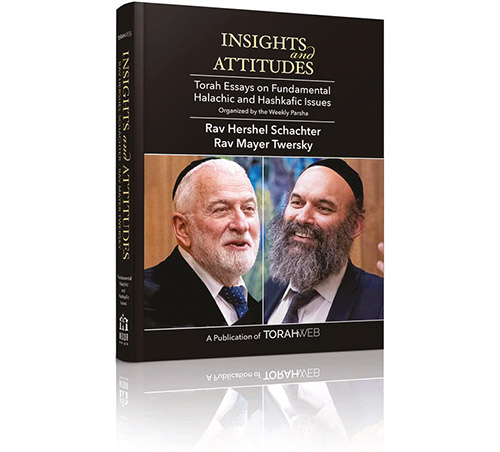
Editor’s note: This series is reprinted with permission from “Insights & Attitudes: Torah Essays on Fundamental Halachic and Hashkafic Issues,” a publication of TorahWeb.org. The book contains multiple articles, organized by parsha, by Rabbi Hershel Schachter and Rabbi Mayer Twersky.
The Gemara (Berachos 19b) and the poskim (Noda BiYehuda, Mahadura Kamma, Orach Chaim siman 35; Teshuvos Divrei Chaim, Orach Chaim 1:35) deal seriously with the following topic: What should one do when observing the Torah laws stands in conflict with basic human dignity?
If one will have to spend more than one-fifth of his total savings in order to fulfill a mitzvas asei, positive commandment, the Shulchan Aruch (Rema, Hilchos Daled Minim, Orach Chaim 656:1 and Yoreh De’ah 157) has established that one is not obligated to fulfill that mitzvah. More than one-fifth is considered hon rav. With respect to avoiding violation of an aveira, one must spend כל הון ביתו, up until the point of ספק סכנת נפשות. Rav Moshe Feinstein (Iggeros Moshe, Orach Chaim 1:172, regarding tekias hashofar) felt that this distinction (between observing a mitzvas asei and avoiding violation of an aveira) applies also with respect to situations where observance of the Torah laws will cause one to get sick. To lose (even only temporarily) one’s health is considered hon rav, just like spending more than one-fifth of one’s savings, and for a mitzvas asei one would not be obligated to incur such a loss. But to avoid violating an aveira, only actual ספק סכנת נפשות would suffice to exempt one from observing the Torah law.
The simple reading of the Gemara seems to apply the same distinction (between a mitzvah and an aveira) with respect to conflicts with human dignity. One would be exempt from performing a mitzvah if its observance would be in conflict with kevod haberiyos, since this too is considered hon rav. However, this consideration would not suffice to permit one to commit an aveira. If the aveira which is conflicting in a particular situation with kevod haberiyos is only derabbanan, the Gemara assumes that it can’t be more severe than a biblical mitzvas asei and therefore may be violated. Several Acharonim (see Kuntres Otzros Yosef, Shevi’is) understood from this Gemara that the same is true with respect to being obligated to spend more than one-fifth of his total savings, i.e., that an aveira derabbanan can’t be more stringent than a biblical mitzvas asei, and therefore one would not be required to spend hon rav to avoid the aveira derabbanan.
The consideration of preserving human dignity is based on a pasuk in Parashas Emor which teaches us that although Kohanim may not come in contact with tumas meis, a dead body, in a situation of a meis mitzvah or one of their seven close relatives passing away, the Torah has obligated Kohanim to defile their kedushas kehuna.
This principle of kevod haberiyos is based on the premises that God created the world and that man was created betzelem Elokim, in the image of God. Showing respect for human dignity is one way of showing respect for Hashem, as all humans possess tzelem Elokim.
Rabbi Hershel Schachter joined the faculty of Yeshiva University’s Rabbi Isaac Elchanan Theological Seminary in 1967, at the age of 26, the youngest Rosh Yeshiva at RIETS. Since 1971, Rabbi Schachter has been Rosh Kollel in RIETS’ Marcos and Adina Katz Kollel (Institute for Advanced Research in Rabbinics) and also holds the institution’s Nathan and Vivian Fink Distinguished Professorial Chair in Talmud. In addition to his teaching duties, Rabbi Schachter lectures, writes, and serves as a world renowned decisor of Jewish Law.










